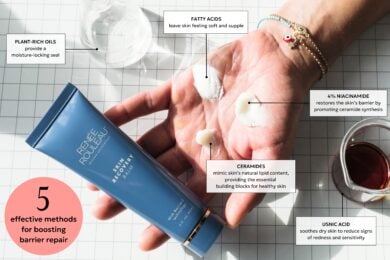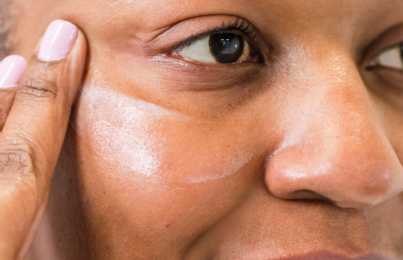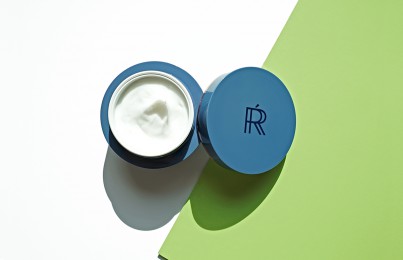Updated 12/18/24. If your skin is feeling dry, tight, and irritated, there is an underlying problem—your moisture barrier is damaged. When people learn this, their first instinct is to layer on a heavy moisturizer, but that won’t fix it. Chances are that you’re doing something day in and day out that’s causing it to stay damaged. The moment you identify (and remove) the culprit, your moisture barrier will naturally repair itself.
Keep reading to learn everything you need to know about your moisture barrier, including what it is, how it works, and what might be damaging it. Plus, learn my expert solutions. You’ll be back to having soft, healthy-looking skin in no time.
What Is a Moisture Barrier?
The moisture barrier is the outermost layer of the skin that helps retain water and provides protection from external aggressors, like bacteria and environmental debris. Think of it like your skin’s personal bodyguard, which helps keep the good in and the bad out. It’s made up of lipids (oils) that bind your skin cells together. When it’s intact, it’s responsible for keeping the skin feeling soft and smooth. When the moisture barrier becomes damaged, small, invisible cracks appear. Through these cracks, moisture can easily escape and irritants can easily enter. The skin may start to feel tight, dry, and sensitive. Essentially, it’s like your skin lost its protective bodyguard. Ouch!
How Can I Tell If My Moisture Barrier Is Damaged?
As an esthetician with 35+ years of experience, I can say that almost every single skin concern can be traced back to a damaged moisture barrier. In fact, not a day goes by that I’m not pinpointing a damaged moisture barrier as the underlying cause of someone’s skin issues.
Common signs of a damaged moisture barrier include redness and rosacea, dryness and dehydration, flakiness and peeling, irritation, itchiness, roughness, a stinging or burning sensation when products are applied, and increased breakout activity. If you experience any or all of these things, no matter your age, you might have a compromised barrier. If that’s the case, keep reading to learn how to fix it.
What Causes a Moisture Barrier to Become Damaged?
There are many different things that can damage your moisture barrier. It could even be a combination of factors, which is why it’s important to be attentive to your skin, as well as your skincare routine and lifestyle habits, to pinpoint the culprit(s). Here are some common causes of damage:
- Over-exfoliation (this is the most common one I see)
- Using drying skincare products (such as alcohol-based toners and high-foaming cleansers)
- Using acidic skincare ingredients (like certain forms of vitamin C that can give a “vitamin acid burn“)
- Washing the face with hot water
- Professional procedures like peels and laser treatments
- Skipping the use of moisturizer
- Too much sun exposure
- Prescription retinoids
- Dry climates and air conditioning
- Using certain skin devices, such as a at-home dermarollers
- Medications that list dryness as a side effect
- Genetics (Some skin types are naturally susceptible to a weak moisture barrier)
- Aging (the moisture barrier becomes more vulnerable after age 45)
8 Ways to Fix a Damaged Moisture Barrier
You haven’t done permanent damage if you’ve been overdoing it with exfoliation for a short period of time. In that case, it’s easily fixable. However, some damage has occurred if you’ve been using harsh products and over-exfoliating for years. Especially if that has gone hand-in-hand with sun exposure. The good news is that it’s never too late to get the skin back to a better place. If you’re making positive changes, I can assure you that you’ll see an improvement. Read on for 10 ways to fix a damaged barrier!
1. Care for Your Skin the Way You Would a Baby’s Skin
If your skin is acting unusually sensitive, a good mindset to have is to care for your skin like you would a baby’s skin. This means keeping everything simple and gentle until it feels back to normal. Go back to basics and lay off potentially irritating active ingredients for some time.
2. Cut Back on Exfoliation
Now that exfoliating products are so popular, many people use them daily. This is hands down one of the biggest and most common contributors to a damaged moisture barrier. When you exfoliate too often, you’re stripping your skin’s protective barrier, which all but guarantees that moisture will escape. This can set off a cascade of inflammation, which not only leads to that uncomfortable dry, tight feeling but also contributes to skin aging.
When you’re trying to fix your moisture barrier, I recommend laying off all exfoliating products for two weeks. Slowly work them back in once your skin feels better. When you reintroduce them into your routine, don’t use them every day. Instead, use them four to five times a week depending on your skin type.
Read my beginner’s guide to exfoliants
Note: If you use a prescription retinoid, know that it works, in part, by breaking down your barrier. While I don’t suggest that anyone stop using one, mainly because it’s so great for getting the skin to look and act younger, I do have some recommendations for how to lessen negative side effects. Read my beginner’s guide to retinol and prescription retinoids.
3. Use a Gentle Cleanser
When fixing a damaged moisture barrier, you’ll want to switch from a foaming cleanser (even if it’s gentle and sulfate-free!) to a cleansing lotion. These cleansers are generally much milder, which is important for dry, tight, or irritated skin.
Read nine surprising cleansing mistakes you need to stop making.
4. Avoid Washing Your Face With Hot Water
Hot water dilates capillaries and raises the skin’s internal temperature. It can also impair the skin’s moisture barrier. That’s why it’s best to use lukewarm water to wash your face—especially in the winter months when the barrier is typically the most fragile.
5. Wear Sunscreen
Sunscreen is the ultimate product for defending your skin from one of the worst sources of environmental damage—the sun. The UVA and UVB rays that are given off by the sun will only contribute to a damaged moisture barrier. That’s why it’s so important to apply sunscreen generously and consistently, rain or shine.
Read this is how much sunscreen you should actually be wearing.
6. Choose a Moisturizer That Contains Specific Ingredients
Moisturizers can certainly aid in fixing a damaged moisture barrier, but it’s important to use those that contain ingredients that mimic the natural lipids found in the skin. And remember, just because a moisturizer feels heavy and greasy doesn’t necessarily mean it will be the best for fixing your moisture barrier. Read why here. It’s all about the ingredients.
Some effective ingredients for barrier repair are borage oil, evening primrose oil, shea butter, phospholipids, niacinamide, ceramides, shea butter and usnic acid.
For quick repair: use Rest Day Masque (it’s great to use as a sleeping masque and is a 2024 Allure Best of Beauty winner!)
For dry skin barrier maintenance: use Skin Recovery Balm (See the five barrier-repairing methods used and how they work)
For acne-prone barrier maintenance: use Skin Recovery Lotion (See this incredible before and after)
Note: You might be looking at some of the above ingredients and think they’d make a rich, greasy moisturizer. That is not the case. A moisturizer can include these ingredients without being heavy and pore-clogging. It all depends on the percentages that are used and the oil-to-water ratio in the formula. Read more about what makes ingredients pore-clogging in this post.
7. Use an Essence
All skin types need water, but when you’re trying to fix your moisture barrier, it’s even more important. After all, when your moisture barrier is damaged, it lets water escape your skin through a process called transepidermal water loss.
One of my favorite ways to deeply hydrate the skin is by using an essence. These products are similar to toners, but they’re serum-infused with water-binding ingredients. They often have a slippery gel-like texture rather than a watery one. My favorite one to use is the Moisture Infusion Toner. It includes phospholipids, moisturizing skin oils, and niacinamide to help strengthen and support the moisture barrier.
Here’s how I recommend using it. Start by washing your face with a cleansing lotion. Then, apply a generous amount of the Moisture Infusion Toner to a Toning Cloth and wipe it over your face. Next, pour a quarter-sized amount into the palm of one hand. Pat the product all over your face using the fingertips of your other hand. Repeat this two more times. Afterward, your skin should feel cool and plump. To finish, seal it in with a serum and moisturizer. I recommend performing this technique twice a day for one to two weeks (although you can certainly make it a year-round habit for hydrated skin).
No matter if you’re using a traditional toner or an essence, apply it within 60 seconds of cleansing. Doing so will prevent water loss. I call this the Golden Minute Rule, and it’s very effective for keeping the skin nice and hydrated.
8. Use Face Oil (the Right Way)
Whenever my clients are in need of a serious fix, I always recommend they use a well-formulated face oil. I suggest patting it over moisturizer as the last step in their nightly skincare routine. This will provide a protective seal over the skin so everything that’s underneath is less likely to evaporate.
How Long Does It Take to Fix a Damaged Moisture Barrier?
If you’re eliminating the things that are causing damage, and you’re investing in the right products to correct it, you should be able to fix your moisture barrier within two to four weeks. For some people, it could be quicker. The skin is truly incredible in that it’s always working to address whatever stressors come its way. That’s why you want to work with it, not against it.
There is really no reason anyone should suffer from dry, tight, or irritated skin. We have advanced so much in skincare. It’s truly an easy fix if you have the right products and at-home regimen.
I hope you found this post helpful. I also hope your skin will return to softer, calmer, and more hydrated state soon.
Next, Read five skincare mistakes everybody makes!
Celebrity Esthetician & Skincare Expert
As an esthetician trained in cosmetic chemistry, Renée Rouleau has spent 35 years researching skin, educating her audience, and building an award-winning line of products. Her hands-on experience as an esthetician and trusted skin care expert has created a real-world solution — products that are formulated for nine different types of skin so your face will get exactly what it needs to look and feel its best. Trusted by celebrities, editors, bloggers, and skincare obsessives around the globe, her vast real-world knowledge and constant research are why Marie Claire calls her “the most passionate skin practitioner we know.”




Comments:
Hi Renee, this post has been a revelation – thank you!! When would you suggest reintroducing exfoliating acids and vitamin c once the moisture barrier has been repaired?
Posted By: Kyla |
Hi! If your moisture barrier is compromised, I suggest focusing on repair for one to two months before slowly reintroducing actives like Vitamin C and exfoliating acids.
Posted By: Renée Rouleau |
hi why I cant find product that suits on my skin,
when I wash my skin in the morning with a cleanser it feels tight and dry and by mid day my skin feels so oily and my skin have white small something on my chin, nose , and on cheeks I think I have a damage barrier can you help me please
Posted By: nicol |
Hi! It sounds like your skin is dehydrated. Be sure to use a gentle, non-irritating cleanser that won’t dry out the skin and look for products with water-based hydration (like hyaluronic acid and oil-free lotions). Since your skin is already producing oil, you don’t need to add any. To repair your barrier, follow the tips in this post!
Posted By: Renée Rouleau |
Hi Renée, I used to have extremely oily skin before I was put on Accutane for my acne. However, since coming off of it my pores have basically dried up and I have been in so much pain since. I’ve since realized my oily skin actually helped my face feel normal. My skin is everything that you said up in the article, but I have tried many moisturizers and other treatments from my doctors. Is there any way to have my skin once again produce the oil it used to? From what I understand Accutane basically drys up the pores and makes them smaller as to produce less oil or sebum. What would you recommend? I’m kinda at my wits end here looking for anything!!
Posted By: Michael |
Hi Michael, if your skin is no longer producing oil, this means you now have a dry skin type and need to consistently give your skin a good balance of water- and oil-based hydration. Try taking our skin type quiz to learn which products would be right for you! You can also book a virtual consultation through our website to get guidance and a personalized routine from one of our estheticians! Also check out this post about healing skin that’s been dried out by harsh acne treatments. Hope this helps!
Posted By: Renée Rouleau |
Hi Renée,
I have thin skin under my eyes and started using an eye cream with retinyl palmitate 3 nights in a row and my under eye looks worse and dry. I think the skin barrier is damaged and the skin can’t take this kind of product. Can you recommend what would be good for repair ?
Posted By: Tiffany |
Hi! Try our Total Eye Repair Cream, it’s very soothing and reparative.
Posted By: Renée Rouleau |
Hi Renee!
I’m curious about daily use of your Vitamin Infused Cleansing Lotion and if it’s okay to use with a damaged moisture barrier. Above you note that acidic ingredients like absorbic acid & citrus based ingredients can contribute to a damaged barrier if you use them daily. However, the Vitamin Infused Cleansing Lotion, which seems to be intended for daily use, contains absorbic acid, vitamin c, and citric acid. Will this product be harmful to a damaged moisture barrier?
Thanks!
Steph
Posted By: Stephany Stamatis |
Hi Stephany! Yes, this cleanser is great if you struggle with your barrier. The ingredients you mentioned are included at low enough percentages so as not to cause further damage to your barrier, even when used every day. Hope this helps!
Posted By: Renée Rouleau |
Hi Renee,
I’ve been dealing with dry, peeling skin around and on my lips. This occured because 4 years ago I repeatedly peeled the dry skin off my lips (biggest regret of my life). The skin doctor gave me steroids for it which i used for 6 months and realised it was becoming less effective and probably ruining my skin. I switched to applying diluted apple cider vinegar to kill the bacteria (what i think it does?) and protecting it with a layer of lanolin oil. I’ve been doing this for years and it helps keep the problem in check but i have to repeatedly put it on or it will start to get itchy and inflamed. I also tried stopping the ACV and just using the oil but it will get itchy without it. The problem is if i do not kill the bacteria, it will definitely spread and make the skin around my lip itch and peel. I desperately want to get rid of this and came by your article and I’m wondering if I have been doing it all wrong :(. Would very much appreciate your help on this. Thank you!
Posted By: Hua |
Hi! We unfortunately don’t carry any lip products, if you’re continuing to have this problem I would recommend making another appointment with a dermatologist as you may need medical intervention. It’s difficult for me to assess the situation with having seen your skin. Good luck!
Posted By: Renée Rouleau |
Hi Renée,
I came across your website as I was researching about how to repair my moisture barrier. I have stopped using all exfoliants, and I believe I have eliminated all active ingredients. I also switched over to a very gentle cleanser. I would like to use a facial oil because I’m still experiencing a lot of dryness. I’m having a hard time discovering if the facial oils I have on hand will make my skin drier or prevent my moisture barrier from healing. I have a bottle of Tartes maracuja oil which has passiflora edulis seed oil and tocopherol listed in the ingredients. I’m concerned that this might not be a good choice since it contains vitamin C. I also have a bottle of Clarins blue orchid oil which contains essential oils of rosewood, patchouli, blue orchid extract, and hazelnut oil. I’m concerned that this may contain too many essential oils. I would really appreciate your opinion on if these oils would be ok to use while restoring my moisture barrier or if I should just wait until the process is finished to incorporate them. I would rather not use them at all if the ingredients may be drying.
Posted By: Serena |
Hi! I would recommend patch testing with these oils first as it is possible they may exacerbate your issues. Our Pro Remedy Oil is a great option if you’re looking for a soothing product that will lock in moisture without causing irritation!
Posted By: Renée Rouleau |
Hi Renée, interesting post I used a product in December harsh toner which has left me with dry irritated ,dermatitis n break outs. I have acne prone skin. I’m
Desperate to get back to normal
My skin is on fire n burning .
Posted By: Fallon |
Hi! I’m so sorry to hear you’re experience problems. Follow the advice in this post and be sure to strip your skincare routine back to basics, avoiding anything that could potentially cause further irritation.
Posted By: Renée Rouleau |
Do you have any product suggestions I need moisturise but the product that has troubled my skin has encouraged oily t zone and I have done a skin analysis showing my skin is extremely dry with slight oil nose creases n chin x
Posted By: Fallon |
Hi! It sounds like you have combination skin, I would recommend our Hydroboost Rescue Creme
Posted By: Renée Rouleau |
Hi Renee,
Thanks for these very informative skincare guides.
Just wondering whether azelaic acid also falls into the exfoliant category. I’ve been trying to incorporate it into my routine but it makes my skin itchy, red, and swollen. They say it’s purging phase, but I wonder…
Posted By: William |
Hi William, I would classify azelaic acid as an exfoliant. If you’re experiencing itchy, red swollen skin, this is a bad reaction and not purging. I would suggest discontinuing the product that’s been causing this. Hope this helps!
Posted By: Renée Rouleau |
Hi Renee,
Can you suggest how to repair the barrier function on the body? I struggle with eczema and while I do sometimes get it on my face, it’s rare. But I frequently get random patches on my body, and itchy arms and legs, and right now my hands are a mess. I wear thick blue rubbery gloves when I’m washing dishes, and I’m careful not to use water that’s too hot when I’m bathing or washing my face. I use hand cream regularly (right now it’s by Andalou Naturals or Weleda). I’m afraid periodically when I wake up in the morning my hands get intensely itchy and I can’t help but rub them furiously which causes them to get puffy and thick and start to crack, and with red patches. I don’t know what causes them to itch first thing in the morning (they sometimes will itch later in the day as well). Any information or suggestions would be greatly appreciated.
Thank you!
Posted By: Geri |
Hi! Read this blog post about repairing dry, itchy skin on the body: https://blog.reneerouleau.com/8-tips-cure-dry-itchy-skin-body/. Hope this provides you some helpful information!
Posted By: Renée Rouleau |